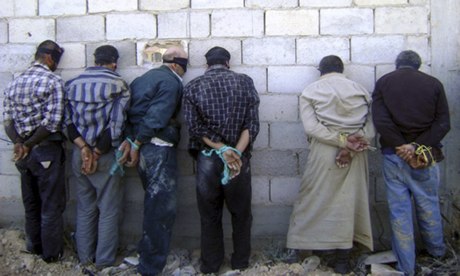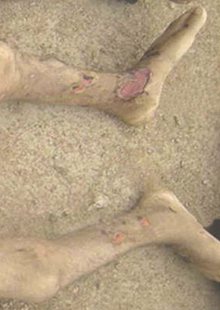International bodies say evidence of execution of 11,000 detainees in regime jails comes from just one area of Syria
Martin Chulov
The Guardian

Detained Syrian men, blindfolded and handcuffed, in Qusair, near Homs. Photograph: Sana/Reuters
"The cache of evidence smuggled out of Syria showing the "systematic killing" of 11,000 detainees in Syrian jails may only be the tip of the iceberg, international aid agencies have said.
The International Committee of the Red Cross, various United Nations bodies and Human Rights Watch have repeatedly complained of having next to no access to detainees and being stonewalled by Syrian authorities despite repeated requests to visit infamous detention sites, such as Sayednaya prison in Damascus.
They said Monday's report by three eminent international lawyers that at least 11,000 victims have been killed while in detention only represents numbers in one part of the country.
"All I know after years of trying to get access is that this is likely to eventually shock the world," one senior official from an international body told the Guardian, on condition of anonymity. "What we have seen in the [war crimes lawyers'] report broadly reflects what we have pieced together over the past few years."
Syrian activists say an estimated 50,000 detainees remain unaccounted for. Tens of thousands of Syrians have been held in detention centres and released, often after months of deprivation and torture.
 Ulceration on the lower shin and foot of a Syrian detainee. Photograph: The Report/Carter-Ruck/EPA
Ulceration on the lower shin and foot of a Syrian detainee. Photograph: The Report/Carter-Ruck/EPA
Most of the 55,000 images taken of the victims' bodies were shot by one official photographer. Many other photographers are attached to security units elsewhere in the country and are likely to have been asked to provide visual evidence of deaths.
Each main city in Syria has several large prisons, off limits to all but elite military and security units but known to hold large numbers of detainees.
Syria has one of the most extensive state security systems in the Middle East. Before the uprising, citizens feared the pervasive reach of more than 15 agencies, which was supplemented by the eyes and ears of the Ba'ath party, whose members were well-attuned to dissent against President Bashar al-Assad and his senior officials.
Since the first stirrings of the uprising in March 2011, security chiefs have been busier than ever. The Military Intelligence, Air Force Intelligence, and Political Security branches have been among the most active, detaining large numbers of citizens, especially in areas held by opposition fighting groups. Syrian rebels and foreign jihadists have also been detained.
International bodies in Turkey, Jordan and Lebanon, have reported they are overwhelmed by the number of families reporting the detention of their relatives. The full scale of the brutality inside Syria's prisons, they say, may never be known.
Refugees outside Syria talk frequently about missing relatives. Conversations in recent months have seemed increasingly desperate, as those who have fled Syria have ever-decreasing means of finding information about those they left behind.
"They came to take him on a night in June," said Subhi Ahmed, a refugee from Aleppo now living in Beirut of his son Mohammed Ali. "It was the Air Force Intelligence and we don't know where he is now. We have not heard a word. We went to the prison before leaving Syria and we have called many times. There is nothing."
Those who have been released from such facilities have told the Guardian and international investigators of the widespread use of summary executions. Detainees have also spoken of torture being routine behind prison walls. In a 2012 report, Amnesty International itemised 31 methods of torture that it said were regularly used on prisoners.
The most rigorous process to establish a precise number has been conducted by Razan Zeitouneh, a Syrian activist and human rights lawyer who works with the Violations Documentation Centre, an organisation that has gathered figures on Syrians in detention since the start of the uprising. Until she too disappeared late last year, Zeitouneh's group had accounted for more than 47,000 missing citizens.
Zeitouneh was seized from an opposition-held district near Damascus. Unlike the bulk of those whose cases she documented, Zeitouneh is believed to have been seized by a jihadist group. She has not been heard from since."

No comments:
Post a Comment